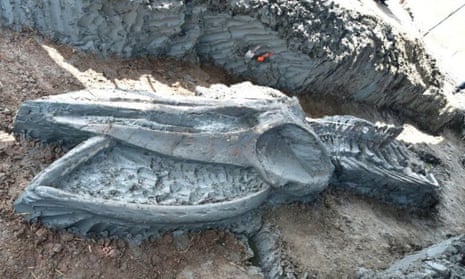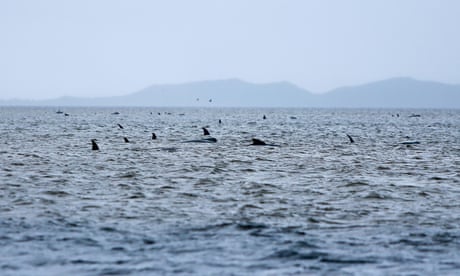Scientists hope remains, thought to be up to 5,000 years old, will deepen knowledge of whale species and of rising sea levels

A whale skeleton thought to be up to 5,000 years old has been discovered, almost perfectly preserved, by researchers in Thailand.
The skeleton, believed to be a Bryde’s whale, was found in Samut Sakhon, west of Bangkok. Researchers have excavated 80% of the remains and have so far identified 19 complete vertebrae, five ribs, a shoulder blade and fins. The skeleton measures 12 metres (39ft), with a skull that is 3 metres long.
The bones will be carbon dated to verify their age, but it is thought they are between 3,000 and 5,000 years old.
Bryde’s whales are still found in Thailand’s waters, where they are considered a protected species. The whales – which prefer waters above 16C (61F), and feed on schooling fish such as anchovies – face threats from fishing equipment as well as tourism.
 More than 120 whales die in mass stranding on Chatham IslandsRead more
More than 120 whales die in mass stranding on Chatham IslandsRead more
The remains, which were found about 12km (7.5 miles) inland, will help scientists understand the evolution of the species, and track how sea levels have changed over thousands of years, said Varawut Silpa-archa, the natural resources and environment minister.
Marcus Chua, of the National University of Singapore, said the discovery adds to evidence of “relatively large sea level changes around 6,000 years to 3,000 years ago in the Gulf of Thailand, where the shoreline was up to tens of kilometres inland of the present coast”.
Previously, only marine deposits containing small fossilised marine shells or crabs had been found inland, and it was not clear if those fossils had been moved by humans, said Chua. “A large subfossil whale dated thousands of years ago near Bangkok would provide strong evidence of where the sea was during that time,” he said.
Such evidence is highly relevant, given that the climate crisis is contributing to rising sea levels. “This could certainly bring attention to the issue, and show how and where low-lying areas could be inundated by the sea when that happens,” said Chua.
The discovery will also help deepen researchers’ understanding of the Bryde’s whale, as well as other marine life. Alongside the skeleton, researchers found preserved items including shark teeth and shells.
“Scientists could also study the deposits found at the same level as the whale to reconstruct the biological communities present during that time, and compare them to present day systems,” said Chua.

The exact age of the skeleton is expected to be confirmed in December.
… as 2023 begins, and you’re joining us from Vietnam, we have a small favour to ask. A new year means new opportunities, and we’re hoping this year gives rise to some much-needed stability and progress. Whatever happens, the Guardian will be there, providing clarity and fearless, independent reporting from around the world, 24/7.
Times are tough, and we know not everyone is in a position to pay for news. But as we’re reader-funded, we rely on the ongoing generosity of those who can afford it. This vital support means millions can continue to read reliable reporting on the events shaping our world. Will you invest in the Guardian this year?
Unlike many others, we have no billionaire owner, meaning we can fearlessly chase the truth and report it with integrity. 2023 will be no different; we will work with trademark determination and passion to bring you journalism that’s always free from commercial or political interference. No one edits our editor or diverts our attention from what’s most important.
With your support, we’ll continue to keep Guardian journalism open and free for everyone to read. When access to information is made equal, greater numbers of people can understand global events and their impact on people and communities. Together, we can demand better from the powerful and fight for democracy.
Source:theguardian.com








